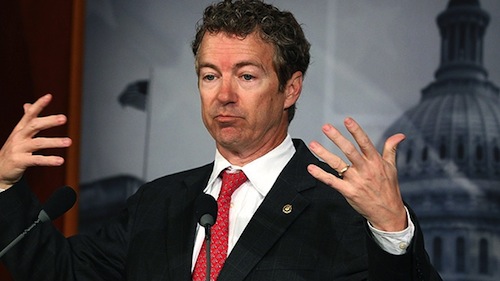We’re in week two of the federal shutdown—which Fox News has taken to calling the slimdown—and default is eight days away. It’s safe to say that some Congressional Republicans are regretting their decision to tie a continuing resolution to defunding Obamacare. That plan didn’t work, in part because it somehow did not include an endgame in which the president called their bluff. An intellectually honest delegation might have admitted defeat and moved forward, but the Republican Party has not. Erick Erickson believes the GOP is winning, for maybe the stupidest reason imaginable. And a growing number of conservative Republicans are telling themselves and the press that—contrary to economists, financiers and the American business community—breaching the debt limit wouldn’t be so bad.
In order to believe that, you have to reject certain agreed-upon principles out of hand. For example, even the Republicans who deny that hitting the debt ceiling would be bad admit that it would spell the end of several important federal services, possibly including Social Security. The important thing, they insist, is that we would still be able to make interest payments. That means continuing to serve the investor class while reducing our accounts payable to what Mick Mulvaney (R–SC) calls “priorities”: namely debt service and the military.
There are a lot of problems with that theory. For one, prioritized payments may create an impossible cash flow problem for the Treasury; covering our obligations exclusively with cash on hand is a complex process that requires a lot of labor hours, and Jack Lew doesn’t think we can do it. There’s also the Fourteenth Amendment. The validity of the public debt of the United States shall not be questioned—a codicil designed to force payment to Union soldiers after the Civil War, but one that may also prohibit the “prioritization” of certain debts in ways that involve, you know, not paying them.
These objections don’t even begin to address the major problem with default: what it would do to world financial markets. Those things run on confidence, and we can talk all we want about paying “essential” debts and still shatter the faith of investors worldwide. But for all its faults, the theory that breaching the debt ceiling wouldn’t be so bad has one thing going for it: it forces the government that Tea Party Republicans wanted all along.
Remember when the sequester was an awful mechanism nobody wanted that would force Congress to reach a budget agreement, and then it didn’t? Fiscal hawks got what they wanted, in the form of across-the-board spending cuts. If your memory does not quite stretch that far, how about the shutdown that started as a lose-lose scenario but also happens to reflect the strict constitutionalist’s dream of a federal government that only performs the barest essential services?
And what does a defaulted government look like? By living off monthly tax receipts and only paying debt service and military expenses plus maybe Social Security, it eerily resembles the dream of the most ardent Tea Party conservative. It also sucks. The American people want Medicaid and an EPA and federal antitrust enforcement. We voted for those things, or we grew up with them, and the Tea Party’s whole complaint is that no one has been able to take them away by legislative means.
The thing about legislative means, though, is that they determine governmental ends. If you break the government, it doesn’t matter what pesky generations of democratic majorities have decided it should do. In the same way that when an evil magician hypnotizes your friend into thinking he’s a chicken, you can cure him by shooting him in the face, the Tea Party can cure decades of welfare-state government by precipitating a fiscal crisis.
The cynical term for this strategy is “starve the beast.” It acknowledges that the American people don’t want to eliminate domestic and social welfare programs, so it relies on bankrupting the federal government instead. Starving the beast has been a plan at least since Reagan, but it’s never gotten closer to becoming a reality than it is now. By my estimate, we’ve got about eight days.
Maybe Tea Party Republicans keep saying that breaching the debt ceiling won’t be a crisis because they see it as an opportunity. Maybe the reason they went into this shutdown with no planned route out is that they don’t want to leave. What the rest of the American body politic considers a disaster, they regard as a goal. The difference between the Tea Party’s goals and those of moderate Republicans, Democrats, economists, businesses and the majority of the American electorate is that we have to achieve ours by building consensus. All they have to do is break everything they can get their hands on.




